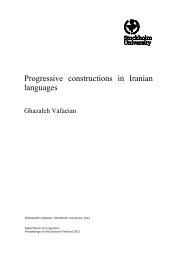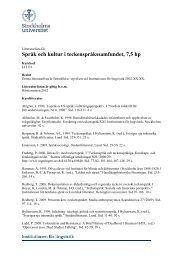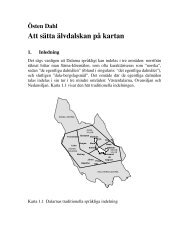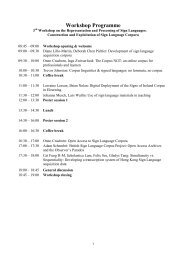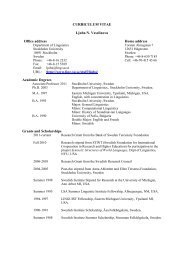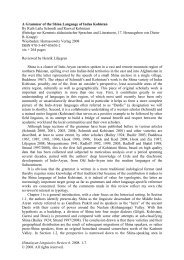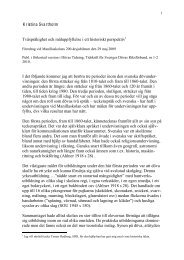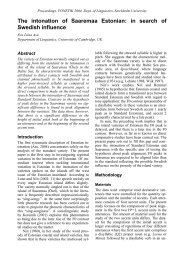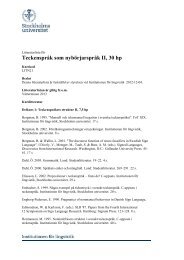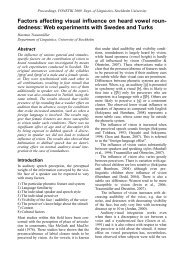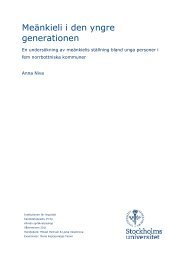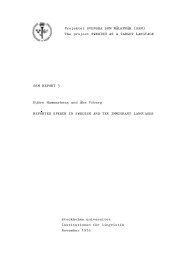Proceedings Fonetik 2009 - Institutionen för lingvistik
Proceedings Fonetik 2009 - Institutionen för lingvistik
Proceedings Fonetik 2009 - Institutionen för lingvistik
Create successful ePaper yourself
Turn your PDF publications into a flip-book with our unique Google optimized e-Paper software.
<strong>Proceedings</strong>, FONETIK <strong>2009</strong>, Dept. of Linguistics, Stockholm UniversityFor English, Spanish and Portuguese,different standards exist in Europe, the Americasand other parts of the world. The panelwas asked whether words in these languagesshould be transcribed in one standard varietyfor each language (e.g., Received Pronunciation,Madrid Spanish and Lisbon Portuguese),one European and one American pronunciationfor each language, or if the local standardpronunciation (e.g., Australian English) shouldas far as possible be provided. The scoresobtained were 27%, 52% and 21% respectively.Obviously, the panel felt a need to distinguishbetween European and American pronunciations,which is done in Nationalencyklopedin. Itcould be objected that native speakers of thelanguages in question use their own variety,irrespective of topic. On the other hand, it maybe controversial to transcribe a living person’sname in a way alien to him-/herself. Forexample, the name Berger is pronounced[ˈbɜːdʒə] in Britain but [ˈbɜ˞ːgər] in the U.S.Audio pronunciationsThere were five questions about audio pronunciations,i.e. clickable recordings. The first onewas whether such recordings should be read bynative speakers in the standard variety of thelanguage in question (as done in the digitalversions of Nationalencyklopedin) or by oneand the same speaker with a swedicizedpronunciation. Two thirds chose the firstoption.The next question dealt with speaker sex.More than 87% wanted both male and femalespeakers, evenly distributed, while 4%preferred female and 8% male speakers. One ofthe subjects opting for male speakers commentedthat men, or women with voices in thelower frequency range, were preferable sincethey were easier to perceive for many personswith a hearing loss.Then subjects were asked if they would liketo use a digital encyclopedia where pronunciationwas presented by means of syntheticspeech recordings. 68% were clearly against,and of the remaining 32%, some expressedreservations like ‘Only if extremely natural’, ‘IfI have to’ and ‘I prefer natural speech’.In the following question, the panel wasasked how it would most frequently act whenseeking pronunciation information in a digitalencyclopedia with both easily accessible audiopronunciations and phonetic transcriptions. Noless than 71% declared that they would useboth possibilites—which seems to be a wisestrategy—, 19% would just listen, wheras theremaining 10% would stick to the transcriptions.This section concluded with a questionabout the preferred way to describe the speechsounds represented by the signs. Should it bemade by means of articulation descriptions like‘voiced bilabial fricative’ or example wordsfrom languages where the sound appears, as‘[β] Spanish saber, jabón’ or by clickablerecordings? Or by a combination of these? Thescores were approximately 18%, 52% and 31%respectively. Several subjects preferred combinations.In such cases, each subject’s score wasevenly distributed over the options marked.Familiarity with IPA alphabetIn order to provide an idea of how familiar thepanel members were with the IPA alphabet,they were finally presented with a chart of 36frequently used IPA signs and asked to markthose they felt sure of how to pronounce. Theaverage number of signs marked turned out tobe 17. Of the 54 panel members, 6 did not markany sign at all. The top scores were [æ]: 44, [ ʃ ]and [o]: both 41, [u]: 40, [ə]: 39, [a]: 37 and [ʒ]:35. Somewhat surprising, [ ʔ ] obtained no lessthan 17 marks.DiscussionApparently, Sweden and Germany are the twocountries where pronunciation in encyclopediasare best satisfied. Many important works in othercountries either do not supply pronunciationat all (Encyclopædia Britannica), or do so onlysparingly (Grand Larousse universel and DenStore Danske Encyklopædi), instead referringtheir users to specialized pronunciation dictionaries.This solution is unsatisfactory because(i) such works are not readily available (ii) theyare difficult for a layman to use (iii) you haveto consult several works with different notations(iv) you will be unable to find the pronunciationof many words, proper names in particular.An issue that pronunciation editors have toconsider, but that was not taken up in the surveyis how formal—casual the presented pronunciationshould be. It is a rather theoreticalproblem, complicated to explain to panel membersif they are not able to listen to any recordings.Normally, citation forms are given, but itcan be of importance to have set rules for how217



